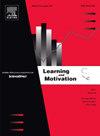Self-determination theory perspectives on the influence of digital learning engagement on motivation in extracurricular learning activities: Considering the mediating role of digital self-efficacy
IF 1.7
4区 心理学
Q3 PSYCHOLOGY, BIOLOGICAL
引用次数: 0
Abstract
The increasing integration of digital media in educational settings has generated considerable interest in exploring its effects on learners' engagement, motivation, and digital self-efficacy, particularly within extracurricular learning activities (ELAs). Understanding how these constructs interact in extracurricular settings is crucial. This research, anchored in Self-Determination Theory (SDT), aimed to investigate the connection between engagement with digital media and motivation in the ELAs, emphasizing the mediating function of digital self-efficacy in China. Utilizing a quantitative research methodology, data collected from 286 secondary school students through validated survey instruments that measured their engagement with digital media, digital self-efficacy, and online learning motivation. The study implemented Structural Equation Modeling (SEM) to analyze the interrelations among these constructs. Results indicated a strong positive relationship between digital media engagement and motivation for online learning, suggesting that the students who actively utilize digital tools tend to demonstrate greater motivation in the ELAs. Additionally, a significant association exists between digital media engagement and digital self-efficacy, indicating that regular interaction with digital platforms enhances learners’ self-confidence regarding their ability to navigate these environments efficiently. Crucially, digital self-efficacy acts as a mediator between digital media engagement and motivation, underscoring the critical role of perceived competence in maintaining student motivation in technology-enhanced learning settings. These results carry practical implications for educators, policymakers, and curriculum developers. Specifically, they stress the importance of creating interventions that enhance digital self-efficacy, such as targeted training programs and supportive digital learning environments, ultimately amplifying learners’ engagement and their motivation in their learning experiences.
自我决定理论视角下数字学习投入对课外学习动机的影响:考虑数字自我效能感的中介作用
数字媒体在教育环境中的日益整合,引起了人们对探索其对学习者的参与、动机和数字自我效能感的影响的极大兴趣,特别是在课外学习活动(ELAs)中。了解这些结构在课外环境中如何相互作用是至关重要的。本研究以自我决定理论(SDT)为基础,旨在探讨数字媒体参与与动机之间的关系,强调数字自我效能感在中国的中介作用。采用定量研究方法,通过有效的调查工具收集了286名中学生的数据,测量了他们对数字媒体的参与、数字自我效能和在线学习动机。本研究运用结构方程模型(SEM)来分析这些构念之间的相互关系。结果表明,数字媒体参与与在线学习动机之间存在强烈的正相关关系,这表明积极使用数字工具的学生往往在ELAs中表现出更大的动机。此外,数字媒体参与与数字自我效能之间存在显著关联,表明与数字平台的定期互动增强了学习者对有效驾驭这些环境的能力的自信。至关重要的是,数字自我效能在数字媒体参与和动机之间起着中介作用,强调了感知能力在保持技术增强学习环境中学生动机方面的关键作用。这些结果对教育工作者、政策制定者和课程开发者具有实际意义。具体而言,他们强调了创建增强数字自我效能的干预措施的重要性,例如有针对性的培训计划和支持性数字学习环境,最终扩大学习者在学习经历中的参与度和动机。
本文章由计算机程序翻译,如有差异,请以英文原文为准。
求助全文
约1分钟内获得全文
求助全文
来源期刊

Learning and Motivation
Multiple-
CiteScore
2.90
自引率
0.00%
发文量
53
期刊介绍:
Learning and Motivation features original experimental research devoted to the analysis of basic phenomena and mechanisms of learning, memory, and motivation. These studies, involving either animal or human subjects, examine behavioral, biological, and evolutionary influences on the learning and motivation processes, and often report on an integrated series of experiments that advance knowledge in this field. Theoretical papers and shorter reports are also considered.
 求助内容:
求助内容: 应助结果提醒方式:
应助结果提醒方式:


